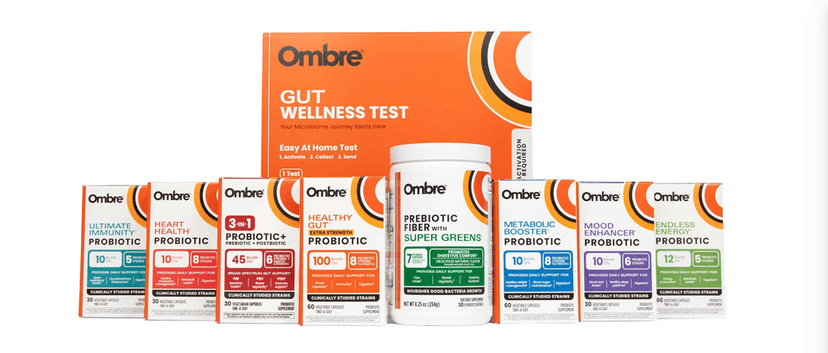Your gut and brain might seem like they have nothing to do with each other, but they are closely connected. Many studies show that your gut health can directly affect your mental health. This connection is known as the gut-brain axis, and it plays a big role in how we think and feel. The gut is often called the "second brain" because it constantly sends information to our central nervous system about the state of our body. Trillions of bacteria in our gut help produce neurotransmitters, which are chemicals that affect our mood and mental well-being. Understanding how this connection works can help us improve both our gut health and mental health.
Key Takeaways
- The gut-brain axis is a two-way communication system that links the gut and brain, affecting our mental and physical health.
- The vagus nerve is a key player in the gut-brain connection, carrying signals between the gut and brain.
- Gut microbiota produce neurotransmitters like serotonin and GABA, which influence mood and emotions.
- A healthy diet rich in fiber, probiotics, and prebiotics can improve gut health and, in turn, mental health.
- Chronic gut issues can lead to mental health conditions like anxiety and depression.
Understanding the Gut-Brain Axis
Components of the Gut-Brain Axis
The gut-brain axis is a complex communication network that links your gut and brain. This system involves various components, including:
- Nervous System: The central nervous system (CNS) and the enteric nervous system (ENS) work together to send signals between the brain and the gut.
- Microbiome: Trillions of bacteria in the gut produce neurotransmitters that affect brain function.
- Chemical Messengers: Hormones and neurotransmitters play a crucial role in this communication.
Role of the Vagus Nerve
The vagus nerve is a major player in the gut-brain axis. It runs from the brain to the colon, acting as a physical link between the two. This nerve helps transmit signals that regulate digestion and emotional well-being. Research shows that the vagus nerve is essential for carrying signals between the gut and brain, influencing mood and stress levels.
Impact on Cognitive Processes
The gut-brain axis significantly impacts cognitive functions. Information from the gut microbiome can affect:
- Mood: Imbalances in gut bacteria are linked to mood disorders like anxiety and depression.
- Cognition: The state of your gut can influence memory and learning.
- Behavior: Changes in gut health can lead to behavioral shifts.
The gut-brain connection is a two-way street, meaning that not only does the brain affect gut health, but the gut also sends signals that can influence mental well-being.
The Role of Gut Microbiota in Mental Health
Neurotransmitter Production
The gut microbiota produces and interacts with various compounds, including neurotransmitters like serotonin and gamma-aminobutyric acid (GABA). Serotonin, often called the "happy hormone," is primarily produced in the gut and influences mood, sleep, and appetite. Disruptions in the gut microbiota can interfere with the production and signaling of these neurotransmitters, contributing to mental health disorders.
Influence on Mood Disorders
Studies have found higher rates of depression and anxiety in patients with gastrointestinal (GI) disorders like irritable bowel syndrome (IBS) and ulcerative colitis. Scientists have identified specific gut microbes that may be connected with mental health conditions. For example, people with depression often have fewer of certain types of bacteria, such as Dialister and Coprococcus, in their guts.
Impact on Cognitive Function
An unbalanced gut microbiome can lead to the production of toxins that enter the bloodstream, affecting cognitive functions like memory and learning. This imbalance can also result in brain fog and difficulties in mood regulation. Maintaining a healthy gut is essential for optimal cognitive function and overall mental well-being.
Physical and Chemical Connections Between Gut and Brain
The Vagus Nerve Connection
The vagus nerve is a major player in the gut-brain connection. This large nerve runs from your brain to your colon, creating a direct physical link between the two. It carries signals that help regulate digestion and emotional well-being. Research shows that the vagus nerve is crucial for communication between the gut and brain. For example, studies in animals have found that the gut microbiome can influence mood through this nerve.
Neurotransmitters and Their Functions
Neurotransmitters are chemical messengers that play a key role in the gut-brain axis. These chemicals help regulate various functions, including mood and digestion. Some neurotransmitters, like serotonin, are produced in the gut. In fact, about 90% of serotonin is made in the digestive tract. This highlights the gut's significant role in mental health.
The Immune System's Role
The immune system also plays a part in the gut-brain connection. The gut contains a large portion of the body's immune cells, which help protect against harmful bacteria and viruses. When the gut is healthy, it supports a balanced immune response. However, an unhealthy gut can lead to inflammation, which may affect mental health. Chronic inflammation has been linked to conditions like anxiety and depression.
The gut-brain connection is a complex network involving physical and chemical pathways. Understanding these connections can help us better manage both our digestive and mental health.
Impact of Diet on Gut and Mental Health
Foods That Promote Gut Health
A healthy diet is essential for maintaining a balanced gut microbiome, which in turn supports mental well-being. Certain foods are particularly beneficial for gut health:
- Probiotic-rich foods: These include live yogurt, kefir, sauerkraut, kimchi, miso, and aged cheeses like cheddar and Swiss. Probiotics are live bacteria that can help maintain a healthy gut flora.
- Prebiotic foods: Foods like garlic, onions, bananas, and whole grains provide nourishment for beneficial gut bacteria.
- Fiber-rich foods: Fruits, vegetables, and whole grains are excellent sources of fiber, which aids digestion and promotes a healthy gut.
Role of Probiotics and Prebiotics
Probiotics and prebiotics play a crucial role in gut health. Probiotics are live bacteria found in fermented foods that can help balance the gut microbiome. Prebiotics, on the other hand, are plant fibers that feed the good bacteria in your gut. Together, they can improve digestion, boost the immune system, and even enhance mood.
Dietary Changes to Improve Mental Health
Making specific dietary changes can have a positive impact on mental health. Here are some recommendations:
- Increase intake of fruits and vegetables: These are rich in vitamins, minerals, and antioxidants that support brain health.
- Incorporate omega-3 fatty acids: Found in fish, flaxseeds, and walnuts, omega-3s are known to improve brain function and mood.
- Limit processed foods: Diets high in processed foods and sugars can lead to inflammation, which is linked to mental health issues like depression.
- Stay hydrated: Drinking plenty of water is essential for overall health, including mental well-being.
A balanced diet not only supports physical health but also plays a significant role in maintaining mental well-being. By focusing on gut-friendly foods, you can help improve your mood and cognitive function.
Gut Health and Common Mental Health Conditions
Anxiety and Depression
The gut and brain are closely linked, and this connection can influence mental health conditions like anxiety and depression. Disruptions in gut bacteria can affect the production of neurotransmitters such as serotonin, which is crucial for mood regulation. Studies have found that people with depression often have fewer beneficial gut bacteria. This imbalance can contribute to symptoms of anxiety and depression.
Irritable Bowel Syndrome (IBS)
IBS is a chronic condition that affects the digestive system and is often linked with mental health issues. Many people with IBS also experience anxiety and depression. The gut-brain axis plays a significant role here, as stress and emotional disturbances can exacerbate IBS symptoms. Conversely, the discomfort and pain from IBS can lead to increased anxiety and depression.
Emerging Treatments and Research
New research is exploring innovative treatments that target the gut to improve mental health. One promising area is fecal microbiota transplants (FMT), where healthy gut bacteria from a donor are introduced into a patient's gut. Early studies show that FMT can improve symptoms of depression and anxiety, although the effects may not be long-lasting. Researchers are also investigating the role of probiotics and prebiotics in supporting mental health by promoting a healthy gut microbiome.
Understanding the gut-brain connection opens new avenues for treating mental health conditions by focusing on gut health. This holistic approach could lead to more effective and sustainable treatments.
Strategies to Improve Gut Health
Dietary Recommendations
To improve gut health, start with your diet. Cutting back on sugar and fats is essential. Instead, focus on foods rich in fiber, nutrients, and natural probiotics. Here are some tips:
- Eat more fiber: Foods like beans, legumes, oats, nuts, fruits, and vegetables are great sources.
- Include probiotics and prebiotics: Probiotics are found in fermented foods like yogurt and sauerkraut, while prebiotics are in fiber-rich foods.
- Stay hydrated: Aim to drink six to eight glasses of water daily.
Stress Reduction Techniques
Managing stress is crucial for gut health. Chronic stress can harm your gut microbiome. Here are some ways to reduce stress:
- Practice relaxation techniques: Try deep breathing, yoga, or meditation.
- Exercise regularly: Physical activity can help reduce stress and improve digestion.
- Take time for self-care: Make sure to carve out time for activities you enjoy.
Probiotic and Prebiotic Supplements
Sometimes, diet alone isn't enough. Probiotic and prebiotic supplements can help maintain a healthy gut. Here are some options:
- Probiotic supplements: These contain live bacteria that can help balance your gut microbiome.
- Prebiotic supplements: These provide the fiber that good bacteria need to thrive.
Improving your gut health can have a significant impact on your overall well-being. By making small changes to your diet, managing stress, and considering supplements, you can support a healthier gut and, in turn, a healthier mind.
Conclusion
In conclusion, the link between our gut and brain is more significant than we might think. Our gut, often called the "second brain," plays a crucial role in our mental health. It communicates with our brain through a complex network of nerves, chemicals, and microorganisms. This connection means that a healthy gut can lead to a healthier mind. By taking care of our gut through a balanced diet, reducing stress, and being mindful of antibiotic use, we can improve our overall well-being. Understanding and nurturing this gut-brain connection is essential for both our physical and mental health.
Frequently Asked Questions
What is the gut-brain connection?
The gut-brain connection is a communication system between your gut and brain. It involves nerves, chemicals, and microbes that send signals back and forth, affecting both digestion and mental health.
How does the gut affect mental health?
Your gut affects mental health through its microbiome, which produces neurotransmitters like serotonin. An imbalance in gut bacteria can lead to mood disorders such as anxiety and depression.
What role does the vagus nerve play in the gut-brain connection?
The vagus nerve is a large nerve that runs from your brain to your gut. It helps transmit signals between the gut and brain, playing a crucial role in regulating digestion and emotional well-being.
Can diet influence the gut-brain connection?
Yes, diet can influence the gut-brain connection. Eating foods that promote gut health, like those rich in probiotics and prebiotics, can improve both gut and mental health.
What are some common gut-related mental health conditions?
Common gut-related mental health conditions include anxiety, depression, and irritable bowel syndrome (IBS). These conditions are often linked to imbalances in the gut microbiome.
How can I improve my gut health?
You can improve your gut health by eating a balanced diet, reducing stress, and taking probiotic and prebiotic supplements. These steps can help create a healthier gut microbiome, benefiting both gut and mental health.
























